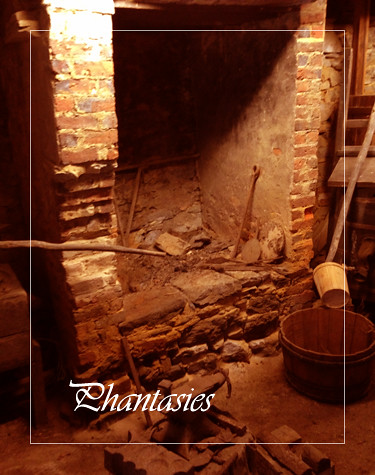
Volume XII, Issue XXVI
Phantasies
By George MacDonald, Chapter 20
Thou hadst no fame; that which thou didst like good
Was but thy appetite that swayed thy blood
For that time to the best; for as a blast
That through a house comes, usually doth cast
Things out of order, yet by chance may come
And blow some one thing to his proper room,
So did thy appetite, and not thy zeal,
Sway thee by chance to do some one thing well."
~ from John Fletcher's "Faithful Shepherdess".
The noble hart that harbours vertuous thought
And is with childe of glorious great intent,
Can never rest, until it forth have brought
Th' eternall brood of glorie excellent."
~ from Edmund Spenser's "The Faerie Queene".
I had not gone very far before I felt that the turf beneath my feet was soaked with the rising waters. But I reached the isthmus in safety. It was rocky, and so much higher than the level of the peninsula, that I had plenty of time to cross. I saw on each side of me the water rising rapidly, altogether without wind, or violent motion, or broken waves, but as if a slow strong fire were glowing beneath it. Ascending a steep acclivity, I found myself at last in an open, rocky country. After travelling for some hours, as nearly in a straight line as I could, I arrived at a lonely tower, built on the top of a little hill, which overlooked the whole neighbouring country. As I approached, I heard the clang of an anvil; and so rapid were the blows, that I despaired of making myself heard till a pause in the work should ensue. It was some minutes before a cessation took place; but when it did, I knocked loudly, and had not long to wait; for, a moment after, the door was partly opened by a noble-looking youth, half-undressed, glowing with heat, and begrimed with the blackness of the forge. In one hand he held a sword, so lately from the furnace that it yet shone with a dull fire. As soon as he saw me, he threw the door wide open, and standing aside, invited me very cordially to enter. I did so; when he shut and bolted the door most carefully, and then led the way inwards. He brought me into a rude hall, which seemed to occupy almost the whole of the ground floor of the little tower, and which I saw was now being used as a workshop. A huge fire roared on the hearth, beside which was an anvil. By the anvil stood, in similar undress, and in a waiting attitude, hammer in hand, a second youth, tall as the former, but far more slightly built. Reversing the usual course of perception in such meetings, I thought them, at first sight, very unlike; and at the second glance, knew that they were brothers. The former, and apparently the elder, was muscular and dark, with curling hair, and large hazel eyes, which sometimes grew wondrously soft. The second was slender and fair, yet with a countenance like an eagle, and an eye which, though pale blue, shone with an almost fierce expression. He stood erect, as if looking from a lofty mountain crag, over a vast plain outstretched below. As soon as we entered the hall, the elder turned to me, and I saw that a glow of satisfaction shone on both their faces. To my surprise and great pleasure, he addressed me thus:
Brother, will you sit by the fire and rest, till we finish this part of our work?"
I signified my assent; and, resolved to await any disclosure they might be inclined to make, seated myself in silence near the hearth.
The elder brother then laid the sword in the fire, covered it well over, and when it had attained a sufficient degree of heat, drew it out and laid it on the anvil, moving it carefully about, while the younger, with a succession of quick smart blows, appeared either to be welding it, or hammering one part of it to a consenting shape with the rest. Having finished, they laid it carefully in the fire; and, when it was very hot indeed, plunged it into a vessel full of some liquid, whence a blue flame sprang upwards, as the glowing steel entered.
There they left it; and drawing two stools to the fire, sat down, one on each side of me.
We are very glad to see you, brother. We have been expecting you for some days," said the dark-haired youth.
I am proud to be called your brother," I rejoined; "and you will not think I refuse the name, if I desire to know why you honour me with it?"
Ah! then he does not know about it," said the younger. "We thought you had known of the bond betwixt us, and the work we have to do together. You must tell him, brother, from the first."
So the elder began:
Our father is king of this country. Before we were born, three giant brothers had appeared in the land. No one knew exactly when, and no one had the least idea whence they came. They took possession of a ruined castle that had stood unchanged and unoccupied within the memory of any of the country people. The vaults of this castle had remained uninjured by time, and these, I presume, they made use of at first. They were rarely seen, and never offered the least injury to any one; so that they were regarded in the neighbourhood as at least perfectly harmless, if not rather benevolent beings. But it began to be observed, that the old castle had assumed somehow or other, no one knew when or how, a somewhat different look from what it used to have. Not only were several breaches in the lower part of the walls built up, but actually some of the battlements which yet stood, had been repaired, apparently to prevent them from falling into worse decay, while the more important parts were being restored. Of course, every one supposed the giants must have a hand in the work, but no one ever saw them engaged in it. The peasants became yet more uneasy, after one, who had concealed himself, and watched all night, in the neighbourhood of the castle, reported that he had seen, in full moonlight, the three huge giants working with might and main, all night long, restoring to their former position some massive stones, formerly steps of a grand turnpike stair, a great portion of which had long since fallen, along with part of the wall of the round tower in which it had been built. This wall they were completing, foot by foot, along with the stair. But the people said they had no just pretext for interfering: although the real reason for letting the giants alone was, that everybody was far too much afraid of them to interrupt them.
At length, with the help of a neighbouring quarry, the whole of the external wall of the castle was finished. And now the country folks were in greater fear than before. But for several years the giants remained very peaceful. The reason of this was afterwards supposed to be the fact, that they were distantly related to several good people in the country; for, as long as these lived, they remained quiet; but as soon as they were all dead the real nature of the giants broke out. Having completed the outside of their castle, they proceeded, by spoiling the country houses around them, to make a quiet luxurious provision for their comfort within. Affairs reached such a pass, that the news of their robberies came to my father's ears; but he, alas! was so crippled in his resources, by a war he was carrying on with a neighbouring prince, that he could only spare a very few men, to attempt the capture of their stronghold. Upon these the giants issued in the night, and slew every man of them. And now, grown bolder by success and impunity, they no longer confined their depredations to property, but began to seize the persons of their distinguished neighbours, knights and ladies, and hold them in durance, the misery of which was heightened by all manner of indignity, until they were redeemed by their friends, at an exorbitant ransom. Many knights have adventured their overthrow, but to their own instead; for they have all been slain, or captured, or forced to make a hasty retreat. To crown their enormities, if any man now attempts their destruction, they, immediately upon his defeat, put one or more of their captives to a shameful death, on a turret in sight of all passers-by; so that they have been much less molested of late; and we, although we have burned, for years, to attack these demons and destroy them, dared not, for the sake of their captives, risk the adventure, before we should have reached at least our earliest manhood. Now, however, we are preparing for the attempt; and the grounds of this preparation are these. Having only the resolution, and not the experience necessary for the undertaking, we went and consulted a lonely woman of wisdom, who lives not very far from here, in the direction of the quarter from which you have come. She received us most kindly, and gave us what seems to us the best of advice. She first inquired what experience we had had in arms. We told her we had been well exercised from our boyhood, and for some years had kept ourselves in constant practice, with a view to this necessity.
But you have not actually fought for life and death?' said she.
We were forced to confess we had not.
So much the better in some respects,' she replied. 'Now listen to me. Go first and work with an armourer, for as long time as you find needful to obtain a knowledge of his craft; which will not be long, seeing your hearts will be all in the work. Then go to some lonely tower, you two alone. Receive no visits from man or woman. There forge for yourselves every piece of armour that you wish to wear, or to use, in your coming encounter. And keep up your exercises.
As, however, two of you can be no match for the three giants, I will find you, if I can, a third brother, who will take on himself the third share of the fight, and the preparation. Indeed, I have already seen one who will, I think, be the very man for your fellowship, but it will be some time before he comes to me. He is wandering now without an aim. I will show him to you in a glass, and, when he comes, you will know him at once. If he will share your endeavours, you must teach him all you know, and he will repay you well, in present song, and in future deeds.'
She opened the door of a curious old cabinet that stood in the room. On the inside of this door was an oval convex mirror. Looking in it for some time, we at length saw reflected the place where we stood, and the old dame seated in her chair. Our forms were not reflected. But at the feet of the dame lay a young man, yourself, weeping.
Surely this youth will not serve our ends,' said I, 'for he weeps.'
The old woman smiled. 'Past tears are present strength,' said she.
Oh!' said my brother, 'I saw you weep once over an eagle you shot.'
That was because it was so like you, brother,' I replied; 'but indeed, this youth may have better cause for tears than that--I was wrong.'
Wait a while,' said the woman; 'if I mistake not, he will make you weep till your tears are dry for ever. Tears are the only cure for weeping. And you may have need of the cure, before you go forth to fight the giants. You must wait for him, in your tower, till he comes.'
Now if you will join us, we will soon teach you to make your armour; and we will fight together, and work together, and love each other as never three loved before. And you will sing to us, will you not?"
That I will, when I can," I answered; "but it is only at times that the power of song comes upon me. For that I must wait; but I have a feeling that if I work well, song will not be far off to enliven the labour."
This was all the compact made: the brothers required nothing more, and I did not think of giving anything more. I rose, and threw off my upper garments.
I know the uses of the sword," I said. "I am ashamed of my white hands beside yours so nobly soiled and hard; but that shame will soon be wiped away."
No, no; we will not work to-day. Rest is as needful as toil. Bring the wine, brother; it is your turn to serve to-day."
The younger brother soon covered a table with rough viands, but good wine; and we ate and drank heartily, beside our work. Before the meal was over, I had learned all their story. Each had something in his heart which made the conviction, that he would victoriously perish in the coming conflict, a real sorrow to him. Otherwise they thought they would have lived enough. The causes of their trouble were respectively these:
While they wrought with an armourer, in a city famed for workmanship in steel and silver, the elder had fallen in love with a lady as far beneath him in real rank, as she was above the station he had as apprentice to an armourer. Nor did he seek to further his suit by discovering himself; but there was simply so much manhood about him, that no one ever thought of rank when in his company. This is what his brother said about it. The lady could not help loving him in return. He told her when he left her, that he had a perilous adventure before him, and that when it was achieved, she would either see him return to claim her, or hear that he had died with honour. The younger brother's grief arose from the fact, that, if they were both slain, his old father, the king, would be childless. His love for his father was so exceeding, that to one unable to sympathise with it, it would have appeared extravagant. Both loved him equally at heart; but the love of the younger had been more developed, because his thoughts and anxieties had not been otherwise occupied. When at home, he had been his constant companion; and, of late, had ministered to the infirmities of his growing age. The youth was never weary of listening to the tales of his sire's youthful adventures; and had not yet in the smallest degree lost the conviction, that his father was the greatest man in the world. The grandest triumph possible to his conception was, to return to his father, laden with the spoils of one of the hated giants. But they both were in some dread, lest the thought of the loneliness of these two might occur to them, in the moment when decision was most necessary, and disturb, in some degree, the self-possession requisite for the success of their attempt. For, as I have said, they were yet untried in actual conflict. "Now," thought I, "I see to what the powers of my gift must minister." For my own part, I did not dread death, for I had nothing to care to live for; but I dreaded the encounter because of the responsibility connected with it. I resolved however to work hard, and thus grow cool, and quick, and forceful.
The time passed away in work and song, in talk and ramble, in friendly fight and brotherly aid. I would not forge for myself armour of heavy mail like theirs, for I was not so powerful as they, and depended more for any success I might secure, upon nimbleness of motion, certainty of eye, and ready response of hand. Therefore I began to make for myself a shirt of steel plates and rings; which work, while more troublesome, was better suited to me than the heavier labour. Much assistance did the brothers give me, even after, by their instructions, I was able to make some progress alone. Their work was in a moment abandoned, to render any required aid to mine. As the old woman had promised, I tried to repay them with song; and many were the tears they both shed over my ballads and dirges. The songs they liked best to hear were two which I made for them. They were not half so good as many others I knew, especially some I had learned from the wise woman in the cottage; but what comes nearest to our needs we like the best.
I
The king sat on his throne
Glowing in gold and red;
The crown in his right hand shone,
And the gray hairs crowned his head.
His only son walks in,
And in walls of steel he stands:
Make me, O father, strong to win,
With the blessing of holy hands."
He knelt before his sire,
Who blessed him with feeble smile
His eyes shone out with a kingly fire,
But his old lips quivered the while.
Go to the fight, my son,
Bring back the giant's head;
And the crown with which my brows have done,
Shall glitter on thine instead."
My father, I seek no crowns,
But unspoken praise from thee;
For thy people's good, and thy renown,
I will die to set them free."
The king sat down and waited there,
And rose not, night nor day;
Till a sound of shouting filled the air,
And cries of a sore dismay.
Then like a king he sat once more,
With the crown upon his head;
And up to the throne the people bore
A mighty giant dead.
And up to the throne the people bore
A pale and lifeless boy.
The king rose up like a prophet of yore,
In a lofty, deathlike joy.
He put the crown on the chilly brow:
"Thou should'st have reigned with me
But Death is the king of both, and now
I go to obey with thee.
Surely some good in me there lay,
To beget the noble one."
The old man smiled like a winter day,
And fell beside his son.
II
O lady, thy lover is dead," they cried;
"He is dead, but hath slain the foe;
He hath left his name to be magnified
In a song of wonder and woe."
Alas! I am well repaid," said she,
With a pain that stings like joy:
For I feared, from his tenderness to me,
That he was but a feeble boy.
Now I shall hold my head on high,
The queen among my kind;
If ye hear a sound, 'tis only a sigh
For a glory left behind."
The first three times I sang these songs they both wept passionately. But after the third time, they wept no more. Their eyes shone, and their faces grew pale, but they never wept at any of my songs again.
(to be continued)
Le Château de St. Albain
Photos by Bob Kirchman
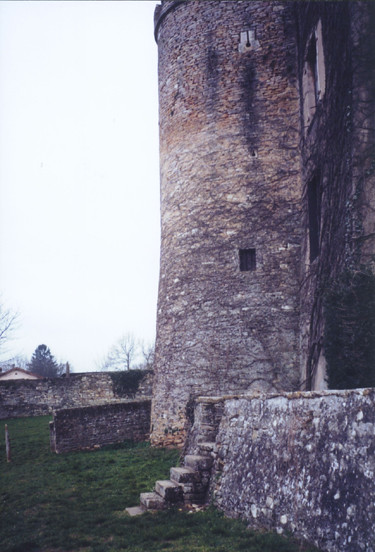
The Tower. Photo by Bob Kirchman.
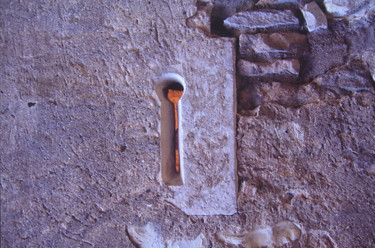
Archer Slit. Photo by Bob Kirchman.
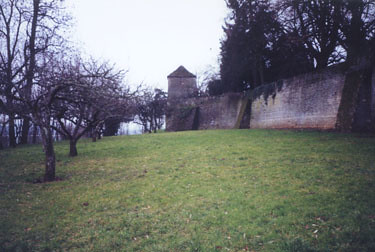
Outer Wall. Photo by Bob Kirchman.
The tower and some of the walls survived the French Revolution and the Schweitzer family once lived here, including the grandparents and the mother of French philosopher, playwright, novelist, political activist, biographer, and literary critic Jean Paul Sartre.
Himeji 姫路市
Photos by Bob Kirchman
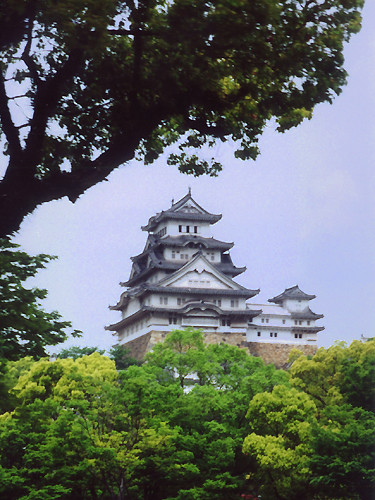
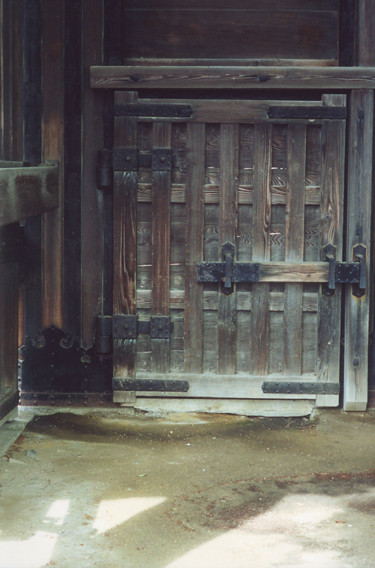
Photos by Bob Kirchman.
In 1333, Akamatsu Norimura first built a fort on top of Himeyama hill. The fort was dismantled and rebuilt as Himeyama Castle in 1346, and then remodeled into Himeji Castle two centuries later. Himeji Castle was then significantly remodeled in 1581 by Toyotomi Hideyoshi, who added a three-story castle keep. In 1600, Tokugawa Ieyasu awarded the castle to Ikeda Terumasa for his help in the Battle of Sekigahara, and Ikeda completely rebuilt the castle from 1601 to 1609, expanding it into a large castle complex. Several buildings were later added to the castle complex by Honda Tadamasa from 1617 to 1618. For over 400 years, Himeji Castle has remained intact, even throughout the extensive bombing of Himeji in World War II, and natural disasters such as the 1995 Great Hanshin earthquake.
C. S. Lewis's Timely Message
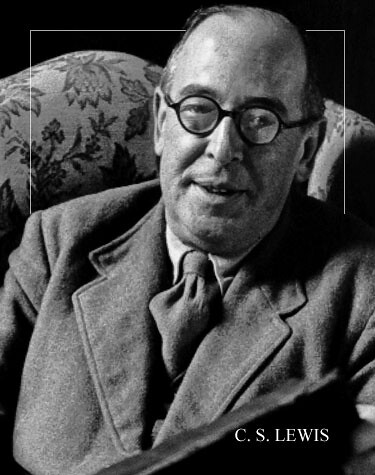
Lewis has a powerful message for our time.
Many of us are quite frustrated as we try to convey the notion that there are greater realities. There are those who stand in solidarity on this and there are those who pretty much see 'truth' as a matter of what they believe about something, saying: "That may be right for you, but what I believe is right for me." Absent from the discussion is the notion that a position might be guided by higher... even DIVINE principles. Might it surprise you that this assault on the notion of 'absolute truth' is not new? What if we find that it influenced the thinkers and textbook writers decades ago... even the work of journalists such as H. L. Mencken, who pretty much eviscerated the victory of William Jennings Bryan in the Scopes Trial.
Hillsdale College in Michigan presents a fascinating series of lectures on the work and vision of C. S. Lewis. All of us who wish to speak of deeper realities into our culture need to avail ourselves of this great resource!

Dr. Larry Arrn, President of Hillsdale College, begins the series with a talk on two of Lewis's works, The Abolition of Man and That Hideous Strength.


Blue Ridge Parkway Stonework
Photos by Bob Kirchman
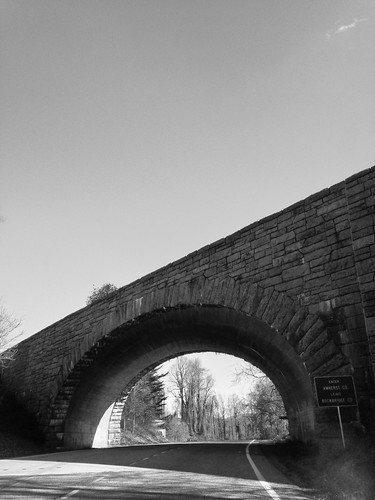
The Bridge over Route 60.
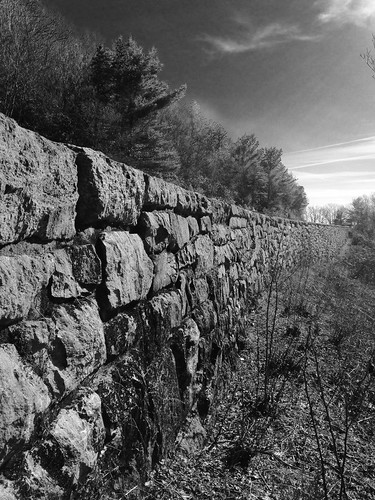
Italian and Spanish stonemasons built these walls and bridges...
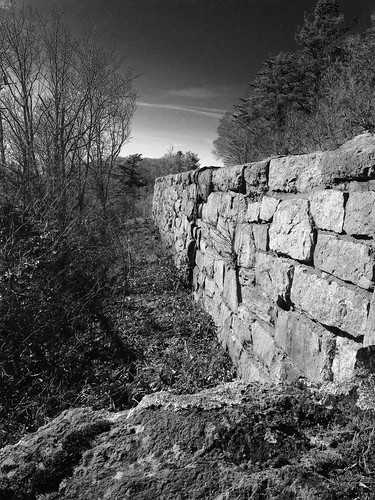
...which are often incorrectly attributed to CCC workers.
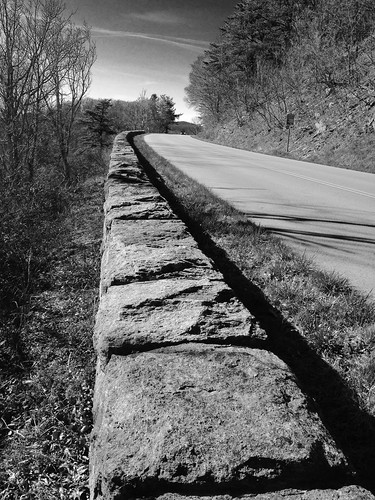
Photos by Bob Kirchman.
C. S. Lewis and MacDonald
I was brought back… (from atheism to Christianity) by the strong influence of two writers, the Presbyterian George MacDonald and the Roman Catholic G. K. Chesterton.” – C. S. Lewis
In his novel, The Great Divorce, C. S. Lewis describes an fictional trip to Heaven where George MacDonald serves as his guide: “I tried, trembling, to tell this man all that his writing had done for me. I tried to tell how a certain frosty afternoon at Leatherhead Station when I first bought a copy of Phantasies (being then about sixteen years old) had been to me what the first sight of Beatrice had been to Dante: Here begins the New Life. I tried to confess how long that life had delayed in the region of imagination merely: how slowly and reluctantly I had come to admit that his Christendom had more than an accidental connection with it, how hard I had tried not to see that the true name of this quality which first met me in his books is Holiness.”
This week’s excerpt from Phantasies and next week’s impress me most particularly as being the type of writing that must have stirred something in young Lewis that would not be satisfied until it found its completeness in the Gospel of Jesus Christ. That MacDonald could dig so deeply into essential humanness is worthy of reflection. That he stirred that awakening in a man who is arguably the Twentieth Century’s greatest apologist is worthy of serious study. Before Marianne Wright compiled her excellent collection of MacDonald excerpts, Lewis published a collection of MacDonald excerpts as well. In introduction Lewis wrote: “In making this collection I was discharging a debt of justice. I have never concealed the fact that I regarded him as my master; indeed I fancy I have never written a book in which I did not quote from him. But it has not seemed to me that those who have received my books kindly take even now sufficient notice of the affiliation. Honesty drives me to emphasize it.”
Vincent van Gogh
The Man You Don't Know
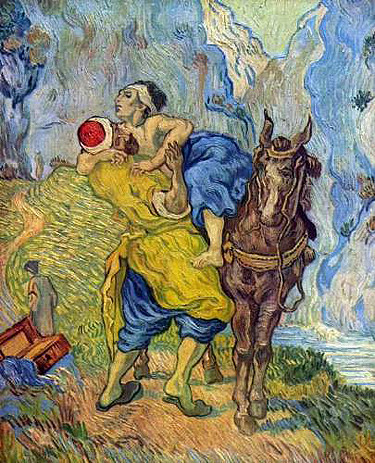
The Good Samaritan, Vincent van Gogh, 1890
Be clearly aware of the stars and infinity on high. Then life seems almost enchanted after all.”
― Vincent van Gogh
Most of us know something of the story of the great Post-impressionist. In the June 28 issue of THYME, we will explore his life and discover some surprising things about the man!
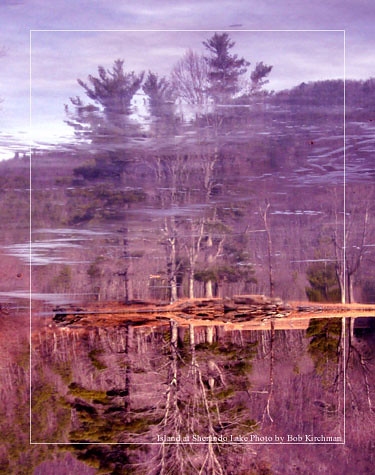
Sherando Lake. Photo by Bob Kirchman.
A Case for Vision VII
© 2017 The Kirchman Studio.
Our nation is in need of an I. K. Brunel's vision today. Our situation is no less dire than that of Bristol in the Nineteenth Century and we need to find direction, both in spirit and economically, if we are to emerge successfully. [1.] Looking at what is happening in North Dakota it is imperative that we find similar opportunity for people in every state of the union. Where shall we look for a vision of the future? Certainly not to an administration that sees massive unemployment and underemployment as a good thing! Many of us have seen our hopes and dreams take a serious hit from the policies of this administration. The marketplace has less resources available to support the creative endeavors we are now supposedly 'free' to pursue. Just ask anyone actually selling fine art these days. People need to be making money in order to spend it! If you are looking to the National Endowment for the Arts to fund your work, guess what? Diminishing tax revenues means less money to fund 'public' art. In fact, the government will be hard pressed to meet obligations such as Social Security and Medicare.
The last administration had no intention of encouraging the true creative sector in this country. In fact, it has became quite clear that they WANTED us discouraged. Our discouragement was essential for them to implement their 'fundamental change' to the country we live in. That is why we must not succumb. I would like to, in the spirit of Theodor Herzl's Aultneuland, give you reason for hope and reason to stay in the fight as well! Herzl was a man with a vision. In Altneuland he was spot-on in describing the nation that was born, or reborn, if you will in the creation of modern day Israel. When Herzl wrote his novel the land was securely in the hands of the Ottoman Empire. In 1917 England's foreign secretary Arthur Balfour wrote a declaration stating that this land should indeed be given as a homeland to the people who had inhabited it since ancient times. World War I saw the end of the empire and British control. It wasn't until 1947 that Israel was truly 'reborn' in the wake of that terrible war.
So, it is essential for us in our time to keep the vision alive that created our own republic. We need to teach our young people, instructing them in the Faith and values that are the true foundation of America's remarkable story. Just like Bristol, England in the Nineteenth Century, we need to look beyond our immediate boundaries and see new possibilities. I believe that ultimately the unseen hand of creativity and human ingenuity can prevail. Will we live to see new wonders? I believe in G-d. I believe in inspiration, and I believe in Imago Dei... the knowledge that in creation G-d did indeed give mankind a small spark of His own creative energy. When Samuel Morse telegraphed: "What hath G-d wrought?" he was correct in his attribution even as he worked with his own hands to make the device. Now we need to be open to the same sort of inspiration. There are things we can make again (or for the first time)!
Consider the more recent story of R. G. LeTourneau, who's company had been awarded a contract to build a machine to lift airplanes by the government during the great war. No one had ever built such a machine before, and the engineers were stumped. Wednesday evening rolled around and LeTourneau announced to his stunned team that he was going to a prayer meeting. "But, sir,... We've got a deadline on this thing!" The great industrialist replied: "But I have a deadline with G-d." LeTourneau went to the prayer meeting. He sang praises and poured out his heart in earnest prayer. He said that walking back to his office from the prayer meeting, he 'saw' the design he was seeking for the machine clearly in his head! What if a modern-day Brunel were indeed to create new dorways for American commerce, as American ingenuity continues to finds new sources for energy to power that commerce. Just think, new geothermal resources powering new frontiers in American inventiveness.
I, for one, refuse to believe that the age of inspiration is past. I do believe that it is essential that we return to the roots of Faith and freedom that have given birth to the American experiment and sustained it. It is not enough to be brilliant in business if we squander the return it gives us in a false sense of entitlement: "For unto whomsoever much is given, of him shall be much required." -- Luke 12:8 So, come with me, in the spirit of Aultneuland, to an America not too far in the distant future. Let us visit a land where a greater vision prevails than simply profit or personal reward. In my youth we once rode the train into Philadelphia from Baltimore. At the time, when you entered into Pennsylvania from Delaware, you were greeted by a large sign that read: "What Chester Makes Makes Chester." The city of Chester was at the time a center of manufacturing and it indeed saw itself in terms of its contributions to the world.
Would that we would see ourselves as contributors to the world once more! If Herzl were to step into his beloved Zion today, he would be amazed to see the center of advanced technology she has become. He would wonder at technologies being developed there that might one day give sight to the blind! Though he forsaw them, the modern cities such as Tel Aviv would still astound him! He would see the amazing works of irrigation that have made Israel the garden state of the world. The flowers we had at our wedding in 1980 came in boxes that proudly proclaimed that they were grown in Israel. Abraham the Patriarch was given the promise in Genesis 22:18: "And in thy seed shall all the nations of the earth be blessed; because thou hast obeyed my voice." What wonderful contributions might we as a people make to the world if we will ourselves heed the voice of the One who created creativity itself?
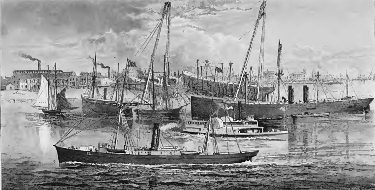
The waterfront of Chester, Pennsylvania in 1875.
